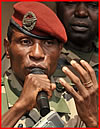Friday, October 23, 2009


The massacre of opposition protesters has provoked outrage, and the widely circulated pictures of gun toting soldiers in sunglasses, and of corpses, the wounded and raped women, are truly shocking. They reinforce prejudices about Africa and damage the continent’s image. The coup is provoking speculation that the prevalence of conflicts and instability may be increasing.
Condemnation has been loud. Guinea faces sanctions from the EU. US Secretary of State Clinton called for the military regime to step down. French Foreign Minister Kouchner has called for international intervention.
The AU set a deadline, now passed, for the coup leader, Camara, to pledge in writing that he will not stand for elections, or face sanctions. It is supporting offers of mediation by Blaise Campaore. This week, the UN Secretary General sent an envoy, Haile Menkerios, to report on the situation. But the official Libyan news agency quoted an AU Presidency spokesperson as saying that “the African Union strongly rejects this intervention (by the UN) which it considers as interference in the internal affairs of an independent country."
In the meantime, the Guinean Government is claiming that negotiations on investment continue, and that a huge deal with Chinese investors is close. Rumours abound that a large down payment has been made to the cash strapped regime. In April this year, a Chinese company cancelled negotiations on iron ore, reportedly responding to concerns about unlawful behavior by the government.
Guinea is resource rich – with gold, diamonds, uranium, bauxite and oil. But its people are poor. It ranked 170th out of 182 countries in the most recent UN Human Development Index, with life expectancy and literacy rates among the lowest in the world.
How the international community now work together – or not – to adopt a common position on Guinea will be very telling.
Will the AU position be coherent? Can the UN forge a concerted approach? Will Guinea’s fledgling EITI committee be able to influence corporate behaviour?
As the Forum on China – Africa Cooperation looms, this could be an opportunity for China to underscore that its commitment to Africa is rooted in international norms, market rules and the long term wellbeing of her people.
From The Africa Progress Panel.
